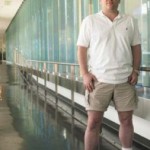 Geneticist Eric Schadt is the quintessential expert. He’s redirecting the practice of biology from a reductionist model to a systems model, which means he knows that finding the cure to a disease is more likely to be done by studying whole systems of genes rather than individual genes. And as if blazing a trail through this new frontier weren’t enough, the way he demonstrates all his expertise is really remarkable.
Geneticist Eric Schadt is the quintessential expert. He’s redirecting the practice of biology from a reductionist model to a systems model, which means he knows that finding the cure to a disease is more likely to be done by studying whole systems of genes rather than individual genes. And as if blazing a trail through this new frontier weren’t enough, the way he demonstrates all his expertise is really remarkable.
Dr. Schadt works to make all of his research findings freely accessible to everybody, including profit-seeking drug companies. He realizes that the information he shares reflects the information he actually knows, which is what comprises his expertise, natch.
To this end, he co-founded Sage Bionetworks, a non-profit biomedical research firm with a mission “to create an open access, integrative bionetwork evolved by contributor scientists working to eliminate human disease.” Not only is he making his own knowledge available, he’s creating a repository for all biologists to make their knowledge accessible, too. Radical!
Just how much intellectual wealth does he share? Alot, all over the Web. Is there a better place to broadcast yourself in 2011? To Schadt, the Chief Scientific Officer of Pacific Biosciences, the answer appears to be “no.” Take a look at:
- His Facebook page, relatively open and visible if you’re logged in
- His mini-lectures on YouTube
- Sage Bionetwork’s data warehouse and podcasts.
We glean so much by studying this guru’s example. Mainly, to be open about the information you have is to show the scope of your expertise. The more information you share, the more expertise you have. So what about you?
While claiming expertise is not for everyone, many people with, say, five or more years of work experience are experts with a certain knowledge, skill or ability. The task is to identify how this is true for you, even if it feels intimidating to claim yourself as an expert. For example, must you have all the answers? We hope not. Experts continue to learn, all the time. If they knew everything, there’d be no need for research. True?
So if you’re perpetually inclined to “hold your cards close to your vest,” take stock of your experience. The people around you probably don’t know the full extent of your expertise — because you hide it. For the sake of your professional development, as well as making the world a better place, open up. If you’re in the field of biology, perhaps you’ll have something to offer the data repository at Sage Bionetworks.
Have you established yourself as an expert? How are you accomplishing this?
Image via YouTube video still



